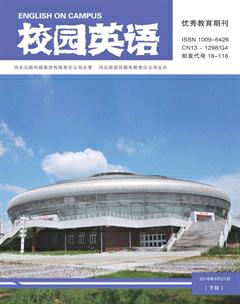On the Suffix of “—ive”
于巾惠
【Abstract】English affixes play an important role in vocabularies. An affix is the collective term for the type of morpheme that can be used only when added to another morpheme (the root or stem). The affix generally refers to the derivation of affixes. The derivational affix is a part of the vocabulary, which indicates the change of word meaning and part of speech. This article mainly talks about the suffix “-ive” from its origin, characteristics , the exceptions and aim to help English learners understand the important meaning of the English words.
【Key words】suffix “-ive” ; origin; characteristics
1. Introduction
The affix contains three parts: prefix, infix, suffix. An affix is the collective term for the type of morpheme that can be used only when added to another morpheme (the root or stem). The affix generally refers to the derivation of affixes. The derivational affix is a part of the vocabulary, which indicates the change of word meaning and part of speech. This article mainly talks about the suffix “-ive” from its origin, characteristics , the exceptions and to help English learners understand the important meaning of the English words. By mastering some rules of words, we can expand our vocabularies and make progress in English study.
2. Suffix
2.1 The Characteristics of the Suffix
First, the suffix is a word formation. It adds after a word or a root and forms a new word. Second, when stem or root words are the same, meaning and semantic differences of synonyms depends on different suffixes. Third, the suffix word not only has the grammatical meaning, but also shows a certain pragmatic and cultural significance. An noun can be added to a suffix and turn to the adjective. Therefore, according to the suffix word ,we can be inferred from the origin of the relationship and to determine the history of language development and the social and cultural factors that produce the language. Fourth, to study affix words not only help enlarge vocabulary, but also help use appropriate language to express ideas,attitude and intentions.
2.2 The Suffix “-ive”
2.2.1 The Origin of Suffix “- ive”
In English, there are three main origins about the affixes: Germanic Latin and Greek. Here we will talk about the origin of suffix “-ive”. The suffix “- ive” is the prototype of the Latin suffix “- ivus” . In the middle ages, French and Latin are both used “- if ”, but Latin is not completely give up “- ivus”. Therefore, the medieval English is compatible and it borrows “- if” and “- ivus ” . But it changed the formation of “ivus” into “- ive”. It refers to following meanings : having a tendency, character, quality, function, connection (tendency of......,......, have... function, related to...). Such adjectives have two characteristics: one is the fuction of descriptive and expanatory is strong. They have the characteristics of verbs and express the active meaning as well as belong to static adjectives. The other is the scope of word-formation is smaller than “- ative”. “-ive” is often attached to those words whose end is “-t” or “- s” , which mostly the verbs. Such as: aggressive, captive, extensive, etc.
2.2.2 The Characteristics of Suffix “ive”
(1)“-Ive” refers to “inclined to; having the quality of” . It can be used to as adjectives suffix. For example:pervasive遍及的(per全部+vas走…全部走遍),incisive一针见血的(in进入+cis切割) .(2)“-Ive” can be used to as nouns suffix. Eg: captive 俘虏, alternative替换物,cooperative合作社,motive动机,native当地人,objective目标,relative亲戚, representative代表. (3) Suffix“-ive” has the active meaning. For example: “accept” is to take something or say yes to someone offers to you ; “acceptive” means it easy to accept; “connect” means join two things together ; “connective” refers to easy to connect.
3. Conclusion
English affix has strong ability to produce new words and is very flexible . It expands English vocabularies in regulary way . Affix is bound morpheme and was lack of independence. So if we master the word formation rules ,we can obtain new words according to those rules. Not only bebefit to our own studying, but also to our future teaching career.
参考文献:
[1]Aronoff,M.1976.Word formation in generative grammar.Cambridge,MA:The MIT Press.
[2]Fauconnier,G.1997.Mapping in thought and language.Cambridge:Cambridge University Press.
[3]薄冰.高级英语语法[M].高等教育出版社,1990.
[4]梁实秋.远东英汉大词典[M].远东图书公司印行,1977.
[5]李平武.英语词根与单词的说文解字[M].福建教育出版社,1984.

